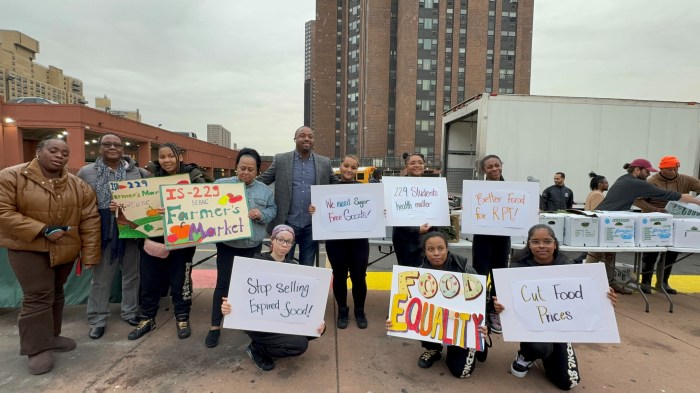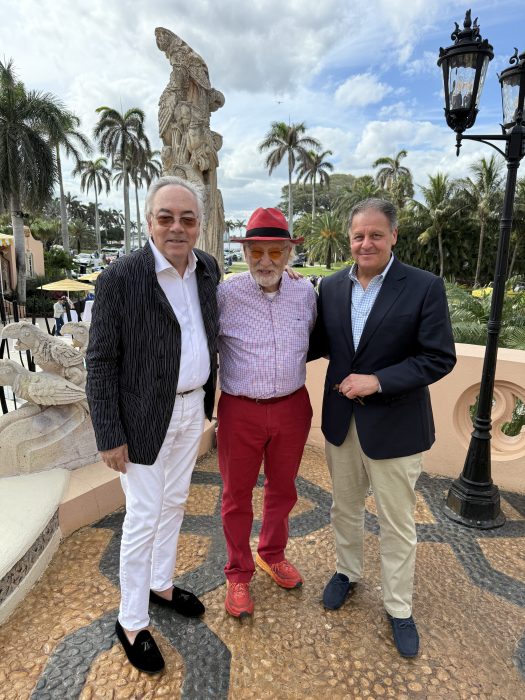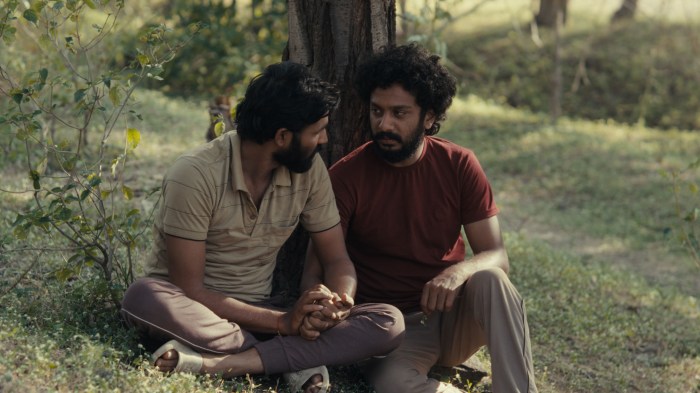By Lincoln Anderson
Since 1986, Jerry Wade has been the go-to guy to get permits for punk concerts in Tompkins Square Park. Wade, known to most by his nickname, “Jerry the Peddler,” applies for the permits from the Parks Department; then, usually someone else handles the rest, from booking the bands to bringing in a stage. Wade then hangs out in the park by the concert in case anything comes up.
“I take care of cops, politicians and bureaucrats,” Wade explained inside his apartment at See Skwat on Avenue C two weeks ago. “They all know me, they can watch me.”
However, Wade and others contend that Parks is now trying to make it tougher for him to get the permits, from charging new fees for overtime for Parks workers to do cleanup after the shows to implementing so-called “quiet days” when amplified sound is banned in the park.
Wade has vainly tried to get a permit for Aug. 5 — one of his most important annual shows, the anniversary of the 1988 Tompkins Square riot — but has been told it’s a quiet day this year. In protest, he plans a metal jam at Seventh St. and Avenue A, during which participants will cause a cacophonous clangor by banging on metal objects like pots, pans and hubcaps.
Meanwhile, Chris Flash, publisher of The Shadow anarchist newspaper, will be putting on a big ’80s punk concert on Sun., July 29, featuring Reagan Youth, Hammerbrain, False Prophets and others. That concert will, at least, commemorate the “mini-riot” that preceded ’88’s big riot, but Wade doesn’t feel that means his show should be swept aside.
Wade says Parks has been making things difficult for him for the last eight years, but that the situation worsened further after a concert in 2004 billed as the “Post-election Rejection Show.” The punk band Leftover Crack, two members of which also live in See Skwat, was nearing the end of their set when trouble broke loose after police ended the show right at the scheduled time.
“The cops pulled the plug and Leftover Crack was left playing air guitar,” Wade recalled. “There were five or six arrests and a couple of cops were hurt. A police van window got smashed.
“The Parks Department has been holding a grudge since then,” he said. “The Parks Department started this overtime — and I’ve refused to pay it.” The overtime fee amounts to about $200 per concert, but Wade says he just doesn’t have the money.
“How the hell can I put up a couple hundred? I can’t even afford to have my phone put on?” he said, whipping a Duane Reade cell phone out of his pants pocket. “Phone cards are $20 a shot. When I got $20, I can have a phone turned on. When I need to use the $20 to buy food, I don’t have a phone — for weeks and weeks. I haven’t had a bank account since the early ’80s. I have a few dollars in a jar.”
Wade does some work in the neighborhood as a superintendent’s assistant, but says he’s “getting ready to go out and get a real job,” perhaps working in a program feeding the homeless, something he enjoys doing.
Home sweet skwat home
To visit Wade at See Skwat — a punk rock band squatter building on Avenue C between Ninth and 10th Sts. — you have to yell up to him in his apartment on the second floor from the top so he can drop the keys out the window in a small plastic bag.
Inside, the hallway walls are festooned with graffiti. The stairways are under reconstruction and currently lack railings on the landings. See Skwat was one of the 11 East Village buildings that the city sold for $1 apiece to the squatters in 2002. The squatters are renovating the buildings themselves with the assistance of the United Homesteading Assistance Board.
Wade apologized for the state of his apartment, which was a bit messy and in midrenovation. Yellow fiberglass insulation was visible stuffed between exposed wooden studs along the walls. He admits some of the other squatters in the building probably have already finished renovating their units.
“The greatest nation is procrastination!” he proudly declared.
Wade, 58, has a ZZ Top beard and an easy, giggly laugh. He was born in Texas, the son of a shoe salesman, “one hundred miles from where Laura Bush grew up and where Bush made his millions,” he noted. “I was born on Flag Day, believe it or not.”
After an Army stint, he refused to go to Vietnam, went AWOL a few years, got caught and did four months in the stockade. After his release, he grew a beard and long hair, became a hippie and started roaming. He met and married a woman from New York City and moved here with her in the 1970s. They later divorced. After living in a few other spots around Manhattan, he settled in the East Village.
Jerry the Peddler’s origin
Wade worked as a bouncer in a porn theater and a laborer on Midtown loading docks, then started selling comic books from the 1950s and ’60s around Astor Pl.
“Where that glass monstrosity is now,” he said.
The vendors swelled to hundreds and Wade found himself their leader.
“We had all sides of Cooper Square, Astor Pl., the parking lots. … People just started calling me Jerry the Peddler,” he said.
But police cracked down on the vast peddlers’ market and that’s when Wade began racking up his many arrests.
“I’ve been arrested probably 200 times,” he said.
Many of Wade’s collars occurred during the late 1980s, when — along with figures like “John the Communist” and Peter Missing — he was one of the leading opponents against imposing a curfew on Tompkins Square Park.
He soon earned the distinction of being the most-arrested person in the neighborhood. Whenever a protest seemed like it might get out of hand, the first thing police would do was look for Wade and immediately arrest him.
Said Clayton Patterson, the Lower East Side documentarian and gallery owner, “Jerry’s skill was that he could lead a chaotic mob.”
Although Wade says he’s a hippie — he stresses he means a hippie from 1968 and ’69, when the hippies “fought back” — he also identifies as an anarchist.
In the mid-1980s, he became a squatter and has lived in several East Village squats over the years, moving when one burned down or when police evicted the squatters from another, Dos Blocos. Police removed Wade from Dos Blocos in shackles.
“At one point, we had 30 buildings, our own bookstore, a blacksmith shop, our own newspaper and a radio station,” he said of the squatter movement.
Wade also was part of the effort to block La Plaza Cultural at Ninth St. and Avenue C from being developed into senior housing. He and others pitched teepees in the garden and held feedings there to prevent the project.
“Casa Victoria [senior housing now on E. Sixth St.] was built, but not there,” he said. “We now have our park and our performance space and we have Casa Victoria.”
The encampment was criticized, however, for having hard drugs.
“Drugs were in the neighborhood,” he said. “We weren’t cops or big security guards.”
One drug Wade does endorse is marijuana. For several years in the early 1980s, he led the Fifth Ave. Pot Parade, but then turned it over to fellow Yippie Dana Beal, who increased its numbers.
As for another substance, Wade managed to beat a drinking problem while at Dos Blocos. He became ashamed that young children in the squat, especially Jael McGreal, then 7, who would become his goddaughter, would see him intoxicated as he worked in the Dos Blocos garden.
“I wanted to be Jerry the Peddler, not Jerry the Drunk,” he said. “I used her as inspiration.”
Wade has collected three thick binders full of newspaper clippings documenting the struggles of the East Village squatters and the eruptions of the Tompkins Square Park riots. The Lower East Side Tenement Museum is currently copying two of his binders for its archives.
“John the Communist had a vision of turning the Lower East Side into the Paris Commune,” Wade reflected. “I had a vision of turning the Lower East Side into Christiania. It was a town in Denmark that the hippies took over. We were well on our way to taking over this neighborhood. After the ’88 riot, it just got too hot.”
Times have changed
Although Wade used to do things like shake up a beer can and spray the foam on police — one of his 200 arrests — he no longer is into such confrontations.
“There might have been a time when revolution could have sprung from those stages,” he said of the Tompkins Square Park concerts. “But that was 20 years ago. We’re definitely not out to fight cops anymore.”
He still relishes the excitement of those bygone days — and, to hear him tell it, so do some police.
“Over the years, I’ve had a half dozen cops come up to me and say, ‘That was the most exciting time of my life,’” Wade said. “Yeah, how could it not be? We disguised it as politics — but it was just hippies fighting cops. I thoroughly enjoyed it.”
Wade has lived in See Skwat since 2000.
“They’re all punk rockers,” he noted of his fellow See Skwatters. “I’m their token hippie. I like hippie music, but hippies just stand there. Punks have energy.”
That energy was definitely on display on a Friday night earlier this month when the squat held a benefit concert in its basement performance space featuring frenetic hardcore bands like Toxic Narcotic. Shirtless, tattooed and sweaty, the young punks, male and female, slammed into each other with abandon in the swirling mosh pit as some took turns swinging above the fray from a rope dangling from a beam overhead.
As the punks moshed furiously inside, Wade sold his buttons on a table out in front of the squat, then went to bed early.
“You see why I didn’t go in there,” he said laughing last Sunday in Tompkins Square Park, where McGreal, now 19, following in his footsteps, was putting on a punk concert. Wade was again selling his political buttons, $1 each, which he makes on a button press in his apartment.
“They’re really messing with us this year,” said McGreal of the Parks Department, as a hardcore band shrieked and thrummed away on the stage. Sporting a pierced tongue and lower lip, she said, “I think they kind of hate us and hate our scene.”
Flash added that the cost of putting on a show is climbing out of community groups’ reach.
“This is making it so prohibitive,” Flash said. “Two hundred and some dollars for overtime, $25 for a park permit, $45 for N.Y.P.D. for a sound permit. … If you rent the Parks Department’s stage it’s $700. Only rich people and corporations can afford to do anything in the park now.”
‘Not denying any permits’
However, Cristina DeLuca, a Parks spokesperson, denied that the department dislikes the punk scene, has been withholding permits or escalating costs.
“We are not denying Jerry’s permit requests,” DeLuca said. “We are also not charging him overtime to hold the event. As long as he, or any organizer, posts bond — which is refundable as long as the park is left in good condition — he is able to hold events in the park. We are also absolutely not attaching overtime fees to keep punk rock concerts, or any type of events, out of the park. These fees are incurred only if an event is held after normal daytime hours and requires staff to work overtime; however, events of a First Amendment nature are waived of this cost. This policy was enacted a few years ago.
“Aug. 4-5 is a ‘non-amplified sound’ weekend and we have such occasions in parks throughout the five boroughs throughout the year,” DeLuca continued. “According to our records, no one has a permit for a concert in the park for Aug. 5. Also, we are absolutely not trying to limit the number of permits for punk concerts — or any genre — in any of our parks. Jerry had a permit for a concert on July 22.”
Told that Parks says it has nothing against him personally, Wade retorted, “That’s bulls–t, and you can quote me on it! The shows definitely help promote the punk scene in the park. If they can get rid of me, there won’t be anything but the honky scene in the park.”
For someone who loved to clash with police, Wade is surprisingly easygoing and gentle seeming. One of the only times he visibly showed anger was when the subject of the HOWL! festival came up. He may not have been aware that this year’s revived HOWL! is running on a shoestring budget and is all volunteer.
“HOWL! is a major organization with corporate sponsorship,” Wade said. “We have to run around borrowing speakers and electrical cords.
“This is the real counterculture,” he said, his usually smiling eyes flashing.




































